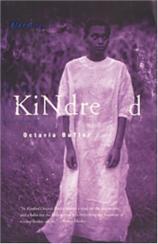Reading Group Guide
Discussion Questions
Kindred (Black Women Writers Series)

1. Both Kevin and Dana know that they can't change history: "We're in the middle of history. We surely can't change it." (page100); and "It's over . . . There's nothing you can do to change any of it now." (page 264). What, then, are the purposes of Dana' s travels back to the antebellum South? Why must you, the reader, experience this journey with Dana?
2. How would the story have been different with a third person narrator?
3. Many of the characters within Kindred resist classification. In what ways does Dana explode the slave stereotypes of the "house-nigger, the handerkchief-head, and the female Uncle Tom" (page 145). In what ways does she transcend them?
4. Despite Dana's conscious effort to refuse the 'mammy' role in the Weylin household, she finds herself caught within it: "I felt like Sarah, cautioning." (page 156), and others see her as the mammy: "You sound just like Sarah" (page 159). How, if at all, does Dana reconcile this behavior? How would you reconcile it?
5. "The ease. Us, the children . . . I never realized how easily people could be trained to accept slavery." This is said by Dana to Kevin when they have returned to the present and are discussing their experience in the antebellum South. To what extent, if any, do you believe racial oppression exists today?
6. How do you think Butler confronts us with issues of difference in Kindred? How does she challenge us to consider boundaries of black/white, master/slave, husband/wife, past/present? What other differences does she convolute? Do you think such dichotomies are flexible? Artificial? Useful?
7. Compare Tom Weylin and Rufus Weylin. Is Rufus an improvement or simply an alteration of his father? Where, if any, is there evidence of Dana's influence on the young Rufus in his adult character?
8. Of the slaves' attitude toward Rufus, Dana observes "Strangely, they seemed to like him, hold him in contempt, and fear him at the same time." (page 229) How is it they can feel these contradictory emotions? How would you feel toward Rufus if you were in their situation?
9. Compare Dana's 'professional' life (i.e. her work as temporary help) in the present with her life as a slave.
10. When Dana and Kevin return from the past together, she thinks to herself: "I felt as though I were losing my place here in my own time. Rufus's time was a sharper, stronger reality." (page 191) Why would the twentieth century seem less vivid to Dana than the past?
11. Dana loses her left arm as she emerges—for the last time in the novel—from the past. Why is this significant?
12. Kevin is stranded in the past five years, while Dana is there for almost one. Is there a reason why Butler felt Kevin needed to stay in the past so much longer? How have their experiences affected their relationship to each other and to the world around them?
13. A common trend in the time-travels of science fiction assumes that one should not tamper with the past, lest s/he disrupt the present. Butler's characters obviously ignore this theory and continue to invade each other's lives. How does this influence the movement of the narrative? How does this convolute the idea of 'cause and effect'?
Kindred (Black Women Writers Series)
- Publication Date: September 15, 1988
- Paperback: 264 pages
- Publisher: Beacon Press
- ISBN-10: 0807083054
- ISBN-13: 9780807083055







